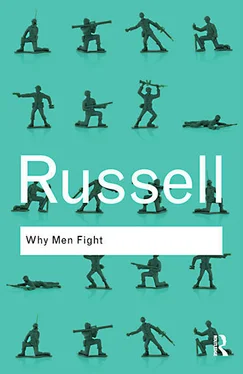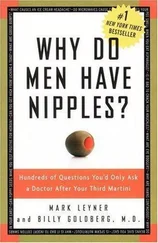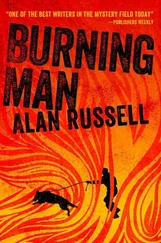The war has made it clear that it is impossible to produce a secure integration of the life of a single community while the relations between civilized countries are governed by aggressiveness and suspicion. For this reason any really powerful movement of reform will have to be international. A merely national movement is sure to fail through fear of danger from without. Those who desire a better world, or even a radical improvement in their own country, will have to co-operate with those who have similar desires in other countries, and to devote much of their energy to overcoming that blind hostility which the war has intensified. It is not in partial integrations, such as patriotism alone can produce, that any ultimate hope is to be found. The problem is, in national and international questions as in the individual life, to keep what is creative in vital impulses, and at the same time to turn into other channels the part which is at present destructive.
Men’s impulses and desires may be divided into those that are creative and those that are possessive. Some of our activities are directed to creating what would not otherwise exist, others are directed towards acquiring or retaining what exists already. The typical creative impulse is that of the artist; the typical possessive impulse is that of property. The best life is that in which creative impulses play the largest part and possessive impulses the smallest. The best institutions are those which produce the greatest possible creativeness and the least possessiveness compatible with self-preservation. Possessiveness may be defensive or aggressive: in the criminal law it is defensive, and in criminals it is aggressive. It may perhaps be admitted that the criminal law is less abominable than the criminal, and that defensive possessiveness is unavoidable so long as aggressive possessive-ness exists. But not even the most purely defensive forms of possessiveness are in themselves admirable; indeed, as soon as they are strong they become hostile to the creative impulses. “Take no thought, saying, What shall we eat? or What shall we drink, or Wherewithal shall we be clothed?” Whoever has known a strong creative impulse has known the value of this precept in its exact and literal sense: it is preoccupation with possessions, more than anything else, that prevents men from living freely and nobly. The State and Property are the great embodiments of possessiveness; it is for this reason that they are against life, and that they issue in war. Possession means taking or keeping some good thing which another is prevented from enjoying; creation means putting into the world a good thing which otherwise no one would be able to enjoy. Since the material goods of the world must be divided among the population, and since some men are by nature brigands, there must be defensive possession, which will be regulated, in a good community, by some principle of impersonal injustice. But all this is only the preface to a good life or good political institutions, in which creation will altogether outweigh possession, and distributive justice will exist as an uninteresting matter of course.
The supreme principle, both in politics and in private life, should be to promote all that is creative, and so to diminish the impulses and desires that centre round possession . The State at present is very largely an embodiment of possessive impulses: internally, it protects the rich against the poor; externally, it uses force for the exploitation of inferior races, and for competition with other States. Our whole economic system is concerned exclusively with possession; yet the production of goods is a form of creation, and except in so far as it is irredeemably mechanical and monotonous, it might afford a vehicle for creative impulses. A great deal might be achieved towards this end by forming the producers of a certain kind of commodity into an autonomous democracy, subject to State control as regards the price of their commodity but not as to the manner of its production.
Education, marriage, and religion are essentially creative, yet all three have been vitiated by the intrusion of possessive motives. Education is usually treated as a means of prolonging the status quo by instilling prejudices, rather than of creating free thought and a noble outlook by the example of generous feeling and the stimulus of mental adventure. In marriage, love, which is creative, is kept in chains by jealousy, which is possessive. Religion, which should set free the creative vision of the spirit, is usually more concerned to repress the life of instinct and to combat the subversiveness of thought. In all these ways the fear that grows out of precarious possession has replaced the hope inspired by creative force. The wish to plunder others is recognized, in theory, to be bad; but the fear of being plundered is little better. Yet these two motives between them dominate nine-tenths of politics and private life.
The creative impulses in different men are essentially harmonious, since what one man creates cannot be a hindrance to what another is wishing to create. It is the possessive impulses that involve conflict. Although, morally and politically, the creative and possessive impulses are opposites, yet psychologically either passes easily into the other, according to the accidents of circumstance and opportunity. The genesis of impulses and the causes which make them change ought to be studied; education and social institutions ought to be made such as to strengthen the impulses which harmonize in different men, and to weaken those that involve conflict. I have no doubt that what might be accomplished in this way is almost unlimited.
It is rather through impulse than through will that individual lives and the life of the community can derive the strength and unity of a single direction. Will is of two kinds, of which one is directed outward and the other inward. The first, which is directed outward, is called into play by external obstacles, either the opposition of others or the technical difficulties of an undertaking. This kind of will is an expression of strong impulse or desire, whenever instant success is impossible; it exists in all whose life is vigorous, and only decays when their vital force is enfeebled. It is necessary to success in any difficult enterprise, and without it great achievement is very rare. But the will which is directed inward is only necessary in so far as there is an inner conflict of impulses or desires; a perfectly harmonious nature would have no occasion for inward will. Such perfect harmony is of course a scarcely realizable ideal: in all men impulses arise which are incompatible with their central purpose, and which must be checked if their life as a whole is not to be a failure. But this will happen least with those whose central impulses are strongest; and it will happen less often in a society which aims at freedom than in a society like ours, which is full of artificial incompatibilities created by antiquated institutions and a tyrannous public opinion. The power to exert inward will when the occasion arises must always be needed by those who wish their lives to embody some central purpose, but with better institutions the occasions when inward will is necessary might be made fewer and less important. This result is very much to be desired, because when will checks impulses which are only accidentally harmful, it diverts a force which might be spent on overcoming outward obstacles, and if the impulses checked are strong and serious, it actually diminishes the vital force available. A life full of inhibitions is likely not to remain a very vigorous life, but to become listless and without zest. Impulse tends to die when it is constantly held in check; and if it does not die, it is apt to work underground, and issue in some form much worse than that in which it has been checked. For these reasons the necessity for using inward will ought to be avoided as much as possible, and consistency of action ought to spring rather from consistency of impulse than from control of impulse by will.
Читать дальше












